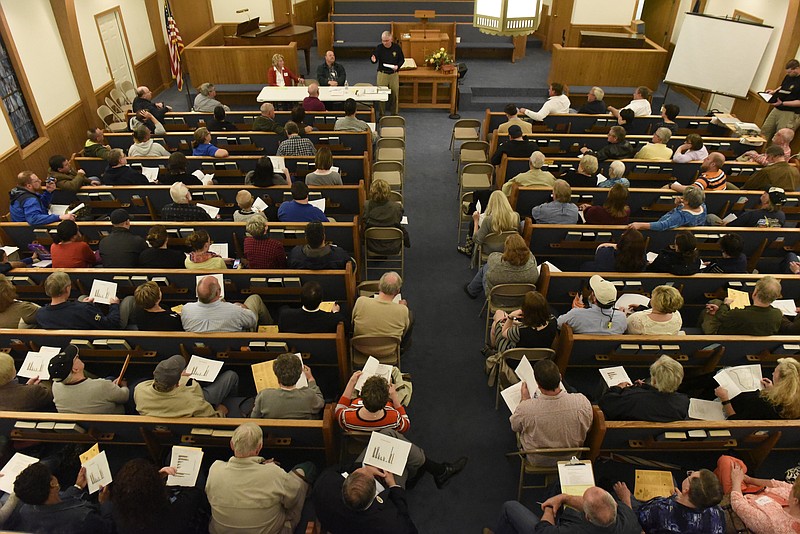Asked about the Walker County, Ga., government's long-term health, a $72 million gulf sits between two candidates.
Shannon Whitfield said Tuesday night on UCTV that taxpayers should consider themselves $84.3 million in debt. That estimation is about 58 percent north of the listed liabilities in the most recent county audit: $53.2 million.
Walker County Commissioner Bebe Heiskell, meanwhile, has long stated that Whitfield's estimations are overblown. In effect, she said in a statement last month, the county is really only about $12.6 million in debt.
The two could face off in the general election come November. Whitfield is running in the May 24 Republican Primary against Mike Peardon. Heiskell plans to run in the general election as an independent.
Asked about the debt, Peardon said he doesn't know who is right. He believes the county's audits are not accurate, that more debt might have been hidden. Is it more than Heiskell's $12 million? Is it more than the $53 million in the audit? Is it more than Whitfield's $84 million?
"When you first started campaigning," Peardon told Whitfield during the forum on UCTV, "you [were] at $55 million [for total county debt]. And it grew from that. You've went to $60 million. I've heard $65 million. I've heard this last report [of $84 million]. You've said, 'Tar and feather me if I'm wrong.'"
Here is how Heiskell and Whitfield have reached different opinions on the county's financial health:
Heiskell starts with the county's long-term debt of $49 million. Then she notes that two bills got paid after the audit. In December, the county paid off a $10 million tax anticipation note. Then, in January, the county paid about $4.3 million off a bond with sales tax revenue.
This put the total debt at $34.7 million. Of that money, Heiskell said in a statement in April, $22.1 million is in the form of a bond the county promised to pay back through sales tax revenue.
Those payments are basically a sure thing, Heiskell said. So if you don't count that, she estimates the total debt is really about $12.6 million.
Whitfield doesn't see the same picture.
First, he still counts the bond that will get paid through sales tax revenue as a debt. Also, he pointed out, Heiskell didn't factor in a separate, $15.3 million bond the county issued in September - which essentially offsets the debt payments the county made in December and January.
On this latest bond, Whitfield said, the county also will pay $10 million in interest over 20 years.
Then, there's the potential debt to Erlanger hospital, which the county's audit does not count because the government and the hospital are entangled in a federal lawsuit over the issue. Whitfield believes the county will lose, costing it an extra $10 million.
On top of all of that, Whitfield said, the county owes its own road department an extra $9 million. He said that Heiskell took sales tax money that was supposed to go to that department and diverted it to an industrial park that the county is using. Whitfield said that Heiskell is still going to have to pay the road department. (Heiskell did not return a call seeking comment.)
All of this math from Whitfield ends with about $84 million in debt. But, he added, the figures could be higher or lower than that. He doesn't have official updated numbers since the audit, which ran through September. If he were commissioner, he said, he would release quarterly reports, providing updated information.
"If they have paid off more debt than this," he said, "we have no knowledge or public record of that."
County attorney issue
During their appearance on UCTV, Whitfield and Peardon debated whether Walker County should keep a full-time lawyer on staff.
Don Oliver has served as county attorney since January 2001, Heiskell's first month in office. Peardon said Tuesday that Oliver could be a useful resource under his administration.
"I have no plans to fire Don Oliver," Peardon said. " With us in the midst of a legal battle with [Erlanger], I'm not sure it's the wisest plan to ditch the lawyer and start with another lawyer."
Whitfield, however, said Oliver's salary is a waste of money. He pointed out that the county still brings in outside counsel to help on some cases. In a civil lawsuit with former State Court Judge Bruce Roberts, the county hired William Cunningham. And in its lawsuit with Erlanger, the county brought in Stuart James.
"It just doesn't make sense to me to have a gatekeeper lawyer on staff that is outsourcing a good portion of the work anyway," Whitfield said.
At this, Heiskell called into UCTV on Tuesday night, explaining that every county must appoint a county attorney such as Oliver. She added that doesn't necessarily mean the lawyer would be on the payroll, though, as Walker County's now is.
Chad Young, a lawyer representing Catoosa County, said he gets paid by the hour. He said that is the standard for most smaller municipalities.
Contact staff writer Tyler Jett at tjett@times freepress.com or at 423-757-6476.
